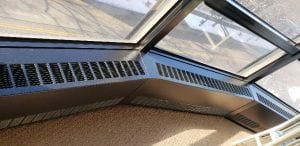Events Calendar
| S | M | T | W | T | F | S |
|---|---|---|---|---|---|---|
30 | 3 | |||||
7 | 13 | |||||
14 | 17 | 20 | ||||
21 | 27 | |||||
28 | 29 | 31 | 1 | 3 | ||
This past winter, the Management Office sent notices and emails to Park Tower tenants and Owners about challenges with our perimeter heating. Thereafter, we received a lot of questions! Most PT residents didn’t know we have perimeter heating, and a fair number didn’t know what it is.
Perimeter heating is a form of radiant heating (no fan motors) that serves only the living room of our two-bedroom units, delivering heat via radiators underneath and running the full radius of the living room windows. Looked at from the outside, that would be around the curved corners of the building’s triangular shape.
Perimeter heating safeguards building integrity, provides warmth to areas closest to the large living room windows, and helps reduce condensation/frost in cold weather. It comes on automatically when the temperature dips to about 45 degrees. Residents may not notice at first, but the colder the temperature outside, the warmer the air radiating from those perimeter registers.
Don’t expect too much of this perimeter heating! It is and was always intended to be supplemental. The primary source of heat in all Park Tower living rooms is the convector assembly housed in the kitchen pantry. These convectors have motors that residents can set to low, medium, or high speeds, and they respond to thermostat settings. (Convectors heat our bed-rooms, too, and in the summers blow cool, conditioned air.)
So, we could not entirely offset the severity of the recent polar vortex, but perimeter heating is very effective in typical winter conditions.
This story was written by Tim Patricio and first appeared in the Mar-May 2019 issue of TowerTalk